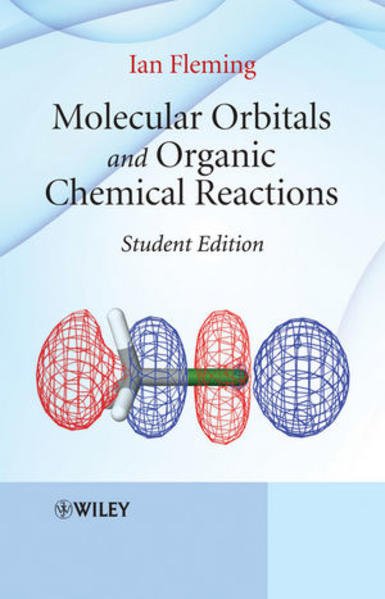Molecular orbital theory I used by chemists to describe the arrangement of electrons in chemical structures. It is also a theory capable of giving some insight into the forces involved in the making and breaking of chemical bonds - the chemical reactions that are often the focus of an organic and breaking of chemical bonds - the chemical reactions that are often the focus of an organic chemist's interest. Organic chemists with a serious interest in understanding and explaining their work usually express their ideas in molecular orbital terms, so much so that it is now an essential component or every organic chemist's stills to have some acquaintance with molecular orbital theory. Molecular Orbitals and Organic Chemical Reactions is both a simplified account of molecular orbital theory and a review of it applications in organic chemistry; it provides a basic introduction to the subject and a wealth of illustrative examples. In this book molecular orbital theory is presented in a much simplified, and entirely non-mathematical language, accessible to every organic chemist, whether student or research worker, whether mathematically competent or not. Topics covered include:
- Molecular Orbital Theory
- Molecular Orbitals and the Structures of Organic Molecules
- Chemical Reactions - How Far and How Fast
- Ionic Reactions - Reactivity
- Ionic Reactions - Stereochemistry
- Pericyclic Reactions
- Radical Reactions
- Photochemical Reactions
Molecular Orbitals and Organic Chemical Reactions: Student Edition serves in a sense as a second edition of the author's influential earlier book Frontier Orbitals and Organic Chemical Reactions, but has been completely rewritten, greatly enlarging the chapters on molecular orbital theory itself, and on the theoretical basis for the principle of hard and soft acids and bases, and a whole chapter on the stereochemistry of the fundamental organic reactions. Correlation diagrams have been added to the discussion of pericyclic chemistry, and a great deal more in that, the largest chapter. A number of new topics, both omissions from the earlier book and work that has taken place in the intervening years, are included, and there are more words of caution in discussing frontier orbital theory itself.
Molecular Orbitals and Organic Chemical Reactions: Student Edition is an individual textbook on this important subject for student or organic, physical organic and computational chemistry.
Inhaltsverzeichnis
Preface xi
1 Molecular Orbital Theory 1
1.1 The Atomic Orbitals of a Hydrogen Atom 1
1.2 Molecules made from Hydrogen Atoms 2
1.3 C-H and C-C Bonds 9
1.4 Conjugation-Hückel Theory 22
1.5 Aromaticity 32
1.6 Strained Bonds-Cyclopropanes and Cyclobutanes 39
1.7 Heteronuclear Bonds, C-M, C-X and C=O 42
1.8 The Tau Bond Model 52
1.9 Spectroscopic Methods 53
1.10 Exercises 57
2 The Structures of Organic Molecules 59
2.1 The Effects of Conjugation 59
2.2 Conjugation-Hyperconjugation 69
2.3 The Configurations and Conformations of Molecules 81
2.4 Other Noncovalent Interactions 90
2.5 Exercises 95
3 Chemical Reactions-How Far and How Fast 97
3.1 Factors Affecting the Position of an Equilibrium 97
3.2 The Principle of Hard and Soft Acids and Bases (hsab) 97
3.3 Transition Structures 103
3.4 The Perturbation Theory of Reactivity 104
3.5 The Salem-Klopman Equation 106
3.6 Hard and Soft Nucleophiles and Electrophiles 109
3.7 Other Factors Affecting Chemical Reactivity 110
4 Ionic Reactions-Reactivity 111
4.1 Single Electron Transfer (SET) in Ionic Reactions 111
4.2 Nucleophilicity 114
4.3 Ambident Nucleophiles 121
4.4 Electrophilicity 134
4.5 Ambident Electrophiles 137
4.6 Carbenes 147
4.7 Exercises 151
5 Ionic Reactions-Stereochemistry 153
5.1 The Stereochemistry of the Fundamental Organic Reactions 154
5.2 Diastereoselectivity 167
5.3 Exercises 183
6 Thermal Pericyclic Reactions 185
6.1 The Four Classes of Pericyclic Reactions 186
6.2 Evidence for the Concertedness of Bond Making and Breaking 188
6.3 Symmetry-Allowed and Symmetry-Forbidden Reactions 190
6.4 Explanations for the Woodward-Hoffmann Rules 214
6.5 Secondary Effects 221
6.6 Exercises 270
7 Radical Reactions 275
7.1 Nucleophilic and Electrophilic Radicals 275
7.2 The Abstraction of Hydrogen and Halogen Atoms 277
7.3 The Addition of Radicals to Bonds 279
7.4 Synthetic Applications of the Chemoselectivity of Radicals 286
7.5 Stereochemistry in some Radical Reactions 287
7.6 Ambident Radicals 290
7.7 Radical Coupling 295
7.8 Exercises 296
8 Photochemical Reactions 299
8.1 Photochemical Reactions in General 299
8.2 Photochemical Ionic Reactions 301
8.3 Photochemical Pericyclic Reactions and Related Stepwise Reactions 304
8.4 Photochemically Induced Radical Reactions 321
8.5 Chemiluminescence 323
8.6 Exercises 324
References 327
Index 331












